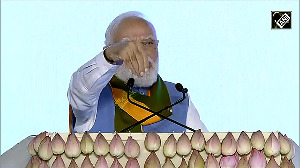Scorecard | Commentary | Analysis | Head-to-head
Images | Preview  | Report
| Report 
Gold is tumbling in value in the international market, did you notice? Today, it closed at $354 per ounce.
$354 is thus today's real value of the specially commissioned gold coin they use for the toss in the World Cup games -- so how much is a Cup game worth?
Carl Hooper will be left pondering that question, as he thinks back to this morning's ceremonial toss at Port Elizabeth -- he called right and, seduced by a tinge of green, a hint of moisture, and a smattering of cloud, opted to bowl first.
Brave man, Hooper -- in the Cup thus far, teams batting first have almost invariably gone on to win the game. "The New Zealand batting is under some pressure, if we can take out a few early wickets, we will be in a good position," Hooper explained before the game began.
If only. On second thoughts, make that almost.
The Kiwis sprang a surprise on the world in 1992, when under Martin Crowe's innovative captaincy they opened the bowling with off-spinner Dipak Patel. Stephen Fleming, who these days lays claim to the Crowe legacy of cerebral captaincy, opened his batting with a left arm spinner -- a pinchhitting option aimed more, you would imagine, to provide a buffer between the new ball and the off-form Nathan Astle.
As a pinch-hitter, Daniel Vettori with 13 off 25 was a failure; in fact, it was the equally off form Fleming who played a pinch-hitter's innings characterized by lusty pulls and drives, that earned him a run-a-ball 25 before Mervyn Dillon, impressive yet again at the top of the Windies bowling card, produced a ball just back of good length that foxed Fleming's extravagant drive and induced a return catch.
In another sense, though, the Vettori promotion worked -- Astle did not have to face the new ball till the 8th over. Tentative at the start, Astle, like Fleming, finally opted to try and hit his way out of trouble; he was aided in this by Nixon McLean's efforts with the new ball.
It has been a while since McLean made it to the West Indies side -- his inclusion in this lineup raises eyebrows. Granting that Pedro Collins had a shocker in the Windies' first game, against South Africa, they still have in the ranks a Corey Colleymore, and, more importantly, the young, pacy Jermaine Lawson, last seen taking 6 wickets for no runs in 15 balls -- admittedly against Bangladesh, but six for nothing is nothing to sneeze at against anybody.
Some speculation is also in order about Vasbert Drakes coming in as first change -- in the first game, Drakes was the one who came in after Collins gave it away, and immediately put things to rights for the bowling side. Here, he had to do it again, this time cleaning up after McLean.
He bowls like an automaton, does Drakes -- an automaton with a brain. His line (just around off) and length (a teasing back of length) are spot-on from ball one, and he is quick to suss batsmen out, as the dismissal of Vettori showed. Seeing the promoted opener looking to make arm-room to swing, Drakes went round the wicket, wide of the crease, and looked to cut down the angle. His third ball on the altered line did the job -- hit length, drew the batsman into the drive, seamed in late, and went through the gate onto middle stump.
58/2 in 12, which was the score when Vettori walked back, did not quite justify Hooper's decision to insert. The problem with depending on moisture and cloud, in South Africa just now, is the sun -- the blistering heat tends to bake the pitch rapidly, and make it batsman friendly by the end of the first hour.
Hooper's luck held, however, when Scott Styris, New Zealand's first match centurion, became another victim of Drakes's mind games. The bowler, whose six stints with Border in the South African domestic season has given him an intimate knowledge of this and other grounds, nodded when Styris went on the back foot to punch him through the covers to a ball just short and fractionally wide outside off. The next was on the same short of length line, and similarly wide, Styris again went on the back foot to punch him square, the ball moved away late, took the toe of the bat, and Powell at point finished things off.
That brought Astle and Chris Cairns together. Astle by then had settled his nerves, and dug deep into his memory to recall the basic ingredients of his game. Their 64-run association was marked by crisp stroke-play, and fine running between wickets before Wavell Hinds got lucky.
It was a good ball, in the corridor leaving the bat late, but there was a good two inches of daylight between bat and ball -- Umpire Rudi Koertzen, not concerned with such trivia, nodded wisely at the appeal for caught behind.
The Kiwis have a habit of losing wickets in little clumps; like seasonal sales in Macy's, it is a case of buy one, get two -- in this case, Lou Vincent whacking a drive straight to Hooper at cover, and Cairns, launching a frustrated hit at the elusive seam of Hinds to get Dillon at long off show off his fine outfielding skills -- cheap.
Hooper controlled the middle session of play beautifully. Hinds came up trumps with ten sequential overs of controlled seam, his forte being an ability to hold his line at gentle pace and gentler swing in the face of the best attempts of batsmen to hit him off it.
Hooper -- who, when bowling, must be the only cricketer with a sub-zero pulse rate (he is also perhaps the only cricketer with 5000+ runs and 100+ wickets in both forms of the game) -- joined Hinds to keep run scoring in check, Drakes and Dillon provided occasional relief, and at 176/6 after 40 overs, the Kiwis looked doomed to a score of around 200-210.
If they got more, it was thanks to a classy partnership between McCullum and Andre Adams. The keeper, coming back into the team thanks to Lou Vincent's horror-show with the gloves in the first game, batted with calm good sense, keeping the board ticking over; Adams took his time to get his eye in, then lived up to his reputation as a big-hitter.
In retrospect, Hooper's decision to bowl Chris Gayle in the final over could be questioned -- but Gayle has been there before. Coming in to bowl at the slog, after McLean's comeback over had gone for 9 runs, Gayle bowled the 42nd over for 5 runs, got a wicket for a run in the 44th, and gave just three in the 45th. Wouldn't you bowl him through? Hooper did, and Gayle went for 12 in the 48th and 16 in the 50th -- 28 runs that helped lift the Kiwis to a competitive 241/7.
"You can't," said Hinds, between innings, "hit the ball around on this ground. You have to work at accumulating runs."
While he was spouting those words of wisdom, his colleagues were having lunch. A pity, as it turned out.
With Bond bowling at searing pace -- fastest on the day, 151.7kph -- the Windies openers focused on survival initially. Chris Gayle decided that since Bond was proving to be un-hittable, Adams had to go and blasted his fourth over for 13 runs, including three successive fours.
In his next over, Adams hit back. You don't, if you are a bowler, bowl wide of off going wider if you hope to take a wicket -- but Gayle, by then in the mood to hit anything that wouldn't hit him back, slashed, got the edge, and Fleming took a stinger in front of his face at slip.
 Lara walked in, played an exquisite square cut (to the fielder) off the second ball he faced, then laced his third, an inswinger on yorker length from Adams, even more stylishly wide of midwicket. While he turned for his third, Lou Vincent from square leg hunted the ball down, produced a sliding stop at wide midwicket, then relayed the ball to Chris Cairns, helpfully yelling at him to throw to the bowler's end. Cairns, with one stump to aim at, hit it -- and Lara walked back, looking stunned.
Lara walked in, played an exquisite square cut (to the fielder) off the second ball he faced, then laced his third, an inswinger on yorker length from Adams, even more stylishly wide of midwicket. While he turned for his third, Lou Vincent from square leg hunted the ball down, produced a sliding stop at wide midwicket, then relayed the ball to Chris Cairns, helpfully yelling at him to throw to the bowler's end. Cairns, with one stump to aim at, hit it -- and Lara walked back, looking stunned.
Shivnaraine Chanderpaul is the most ungainly batsman in international cricket today, especially at the start of his innings -- the way he walks about in front of his stumps, his head bobbing around like a boat on the un-Pacific Ocean, is an invitation to bowlers. Oram bowled straight and full, Chanderpaul was too busy moving around to sight the line, the ball beat the bat and hit the pad, and the Windies had lost another.
And another. They say of Hooper's genius that he can think of five different shots to each ball. The one shot he should not have played to a short ball on off was the hook -- Fleming, who knows his man, had put a fielder out at deep and wide fine leg, and Hooper picked out Bond without the latter having to move a muscle.
In between, good captaincy got rid of Hinds. Once Gayle left, Hinds decided to go for the booming drives. Fleming put a man right in his face, at a very short cover, Hinds blasted a drive at an Adams delivery outside his off and Scott Styris took the rocket, over his head, without batting an eye.
5/46 became 6/80 when Ricardo Powell played all around the line of a straight one from Oram and was bowled. Ridley Jacobs walked in and with him, walked Sanity.
At one end, the classy Ramnaresh Sarwan played a Test match innings, punctuated by flowing strokeplay; at the other, Jacobs grimly resisted all efforts by the Kiwis to dislodge him and, once set, began stroking the ball around and running the singles and twos well.
It could have been a match winning partnership, but for two reasons. The first was obvious -- being the last recognized pair, they had to stay in there; this precluded risky shots.
The second was the Kiwi fielding. The bowlers did their bit by bowling line and length and slowing the pace down -- but the same bowlers, backed by most other fielding sides in the business, would have gone for plenty.
Maybe that is how the Kiwis pick their team -- they chose the 11 best fielders in the country, and reckon any runs they get with the bat or wickets with the ball is a bonus. Here, they used their fielding like a python uses its muscles, coiling around the Windies batsmen and slowly, surely, strangling them.
The Windies eventually fell short by 20 runs -- and gifted four valuable points to the Kiwis. Hooper's men can take with them one sobering thought. Even in the face of the well-drilled Kiwi bowlers and spectacular fielders, the last four West Indies wickets added 141 runs at a fair pace. If only one batsman in the top five had shown half of Sarwan's application, the outcome would have been different. Then again, if ifs and buts were pots and pans, I would have been Navjot Singh Sidhu.





